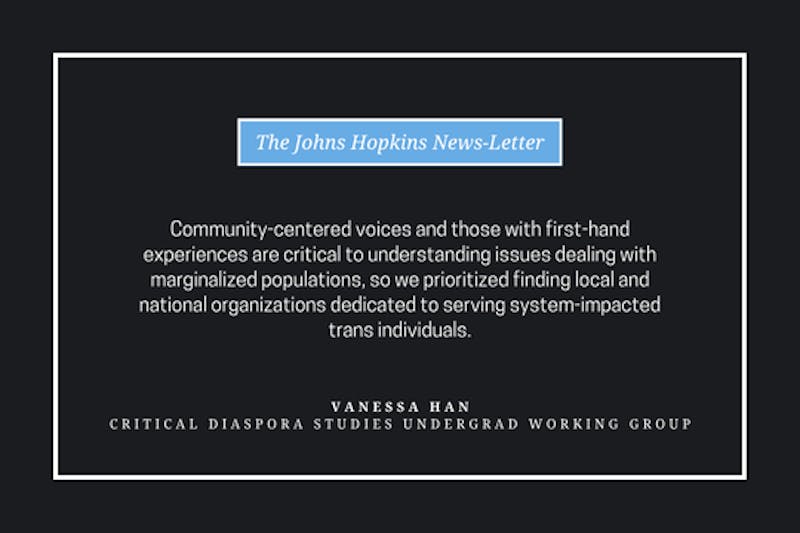On October 8, 2025, the Critical Diaspora Studies undergraduate working group at Johns Hopkins University organized a panel discussion focused on transgender justice within the carceral system. The event aimed to shed light on the challenges faced by transgender individuals who experience incarceration, featuring insights from experts in the field.
Hailey Saya Tomlinson, a senior majoring in Sociology and International Studies, moderated the panel. Among the speakers were Dr. Nicole Morse, a professor at the University of Maryland Baltimore County, and Dr. Vesla Weaver, a Political Science and Sociology professor at Hopkins. Arianna Lint, a transgender educator and advocate, participated virtually.
Dr. Morse’s research intersects media studies and LGBTQ+ identity, and they are currently working on a book titled Bending the Bars: Queer Conspirators Against Carcerality, which explores the experiences of queer individuals impacted by the carceral system. Dr. Weaver co-directs the American Prison Writing Archive and has authored several works analyzing race and incarceration dynamics in the United States. Lint is the founder and CEO of Arianna’s Center, an organization dedicated to supporting trans women of color in Florida, offering resources such as emergency housing and educational support.
In an email to The News-Letter, senior Vanessa Han, a member of the working group, emphasized the importance of including voices from the community. “Community-centered voices and those with first-hand experiences are critical to understanding issues dealing with marginalized populations,” Han noted, highlighting the balance between academic insight and real-world experience.
The panelists shared their personal and professional experiences related to transgender justice. Lint discussed her advocacy work in HIV and AIDS care for incarcerated individuals and the financial challenges her organization has faced due to changes in political support. Dr. Morse reflected on their past marriage to a prison guard and the influence of the Black and Pink program on their activism. Dr. Weaver pointed out that while her work does not typically focus on transgender justice, understanding the historical and political contexts of the prison system is crucial to comprehending broader societal issues.
During the discussion, Tomlinson raised questions regarding the impact of the Trump administration on the treatment of transgender individuals in prisons. Dr. Morse pointed out that the administration’s policies have resulted in trans women being placed in men’s prisons, often leading to solitary confinement as a protective measure against potential violence. “Solitary confinement for longer than 15 days is classified as torture,” they stated, underscoring the urgent need for advocacy and solidarity with incarcerated individuals.
The panel also addressed the challenges faced by transgender immigrants due to policies enforced by the U.S. Immigration and Customs Enforcement (ICE). Lint shared the struggles of many transgender immigrants who hesitate to access resources for fear of detention. She expressed frustration with government inaction, highlighting the disconnect between policymakers and the communities they are meant to serve.
Dr. Weaver spoke on the importance of archival work in understanding incarceration, noting that personal narratives often provide a more nuanced view than statistics alone. “Incarcerated people are often excluded from the statistics that measure the country’s well-being, suggesting that the government may not be acting in the interest of the affected people,” she explained.
The event concluded with an engaging Q&A session where audience members posed questions about the future of prison reform and the balance between advocating for abolition and improving current conditions. One student asked how to reconcile differing perspectives within the advocacy community. Dr. Weaver remarked on the historical outcomes of litigation meant to alleviate overcrowding, which often led to the construction of more prisons. However, she also highlighted successes in the abolition movement, such as the closure of numerous juvenile facilities.
In response to a question about the risks of visibility for queer individuals, Dr. Weaver argued for the necessity of maintaining records of historical injustices to prevent the recurrence of past mistakes. “We are vulnerable. Does that mean that I’m going to stop talking about incarceration? No,” she asserted.
Tomlinson concluded the discussion by sharing resources for those interested in engaging with transgender and carceral justice issues, including local organizations such as the Trans Rights Advocacy Coalition and Trans Maryland.
Vanessa Han expressed hope that participants would leave with a deeper understanding of the complexities surrounding transgender experiences within the carceral state. “With these first steps of education, we hope audience members will become more involved, whether through CDS, similar course topics, research projects, community engagement, or more,” she stated.
This event not only fostered a critical dialogue on transgender rights but also emphasized the necessity of interdisciplinary approaches to advocacy and understanding within the realm of social justice.
